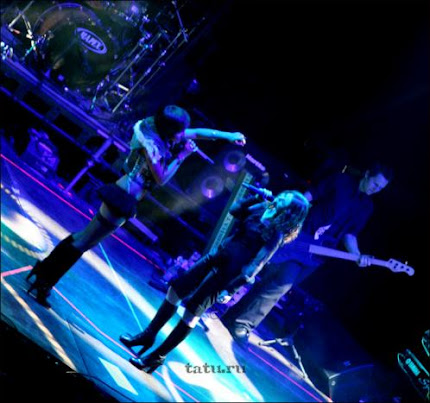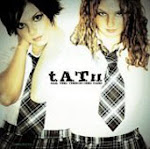Esta es otra entrada del blog oficial de "Finding t.A.T.u."...

By Brett Forrest/Moscow

Despite the movie business's reputation for waste and excess, there are few places more ruthlessly scheduled, more efficiently choreographed than a film set.
Unless that set happens to be in Russia.
On a recent morning in Moscow, the crew for You and I, an English-language movie directed by British filmmaker Roland Joffé, huddled listlessly around a candy-red Ferrari in the shadow of the Hotel Ukraine. The Ferrari scene was critical to the story, a coming-of-age drama about two young women caught up in Moscow's high life, but the crew's idleness was now stretching into hours. The shoot required a police escort that had been approved well in advance. But the Moscow city police on hand seemed bent upon giving the moviemakers yet another real-world lesson on the inexplicable, infuriating and often interminable delays endemic to Russia. The making of You and I, the third film produced in Moscow for a Western audience, has been awash with such cultural exchanges, Russian obliqueness grating against the time-is-money priorities of Hollywood. For the foreigner, Moscow can be a maddening place to do business, with a professional culture seemingly predicated on aggravation and obfuscation. "We have Western ambitions, but the process used to achieve those ambitions is Russian," says Joffé, the Oscar-nominated director of The Killing Fields and The Mission. "It's like being given Lada parts and being expected to make a Maserati."
Still, the film business here, like many industries in today's Russia, is booming, with the domestic box office growing from $25 million in 2000 to, by some estimates, nearly $600 million last year. Whether making movies for the Russian market or shooting on location for an international audience, Hollywood studios and talent are getting involved, keen to exploit local knowledge while helping to revive a system that once produced some of the world's finest films by directors such as Sergei Eisenstein and Andrei Tarkovsky. Soviet cinema collapsed when state funding disappeared at the close of the communist period. A great bulk of filmmakers migrated to advertising and television, which adjusted more organically to capitalism. The result was a tattered film industry: in the mid-'90s, Russia produced little more than a dozen feature films per year. Mosfilm, the oldest movie studio in Russia and the former center of Soviet cinema, is gradually rediscovering its identity. It has partnered with a grouping of independent studios and producers, welcoming onto its lot such outfits as the Moscow-based Russian American Movie Company (RAMCO), which is making You and I. "For the last 15 years, Russian movie production has been at a very low level," says Sergei Konov, RAMCO's general director, holding forth in his Mosfilm office. "Right now it's trying to renovate, but it's very complicated."
Konov and his partner, Leonid Minkovski, established RAMCO in 2004. With Los Angeles movie-world relations and political and financial connections in Moscow, they have attracted Western directors and actors to the Russian capital for the first time. RAMCO shot Silent Partner, a political thriller starring Tara Reid, in Moscow in 2005. The company also produced the recently released Captivity, with Elisha Cuthbert, which was filmed almost entirely on a Mosfilm soundstage.
Low production costs are a key incentive for shooting in Moscow. It's a famously expensive city, but cheap Russian labor can make a positive impact on the bottom line. "The unions in Hollywood are worse than the Russian mob," says Minkovski, who reckons it's 25% cheaper to make a film like You and I in Moscow than in the U.S.
That said, RAMCO is still working out the kinks and, so far, Russia's promise as a movie mecca has outstripped what it has delivered. Budgeted for around $10 million, Captivity nearly doubled in cost by the time all reshoots and editing were complete. And super-low costs can't make up for miserable ticket sales: Captivity has earned only $8.5 million in box-office revenue, Silent Partner went straight to DVD, and You and I has yet to find a distributor, though RAMCO hopes to release the film worldwide by next fall. As Konov and Minkovski wrap up for the day, several executives from Warner Bros. (which is owned by TIME's parent company, Time Warner) arrive at the RAMCO offices for an exploratory meeting. Nearly all of the major Hollywood studios have been sniffing around Moscow recently, trying to figure out how and when to get involved in an industry with a potentially massive upside. Twentieth Century Fox, which purchased the international rights to the ethereal Russian vampire movies Night Watch and Day Watch, opened offices in Moscow last year. Paramount and Disney are kicking the tires. And Sony, through its Columbia Tristar division, joined with several American investors last year to form Monumental Pictures, which is producing Russian-language movies for the domestic market. Monumental's general director, Paul Heth, an American, built the first Western-style cinemas in Russia. He and his business partner, Shari Redstone, the daughter of Viacom chairman Sumner Redstone, have watched Russian movies begin to reclaim their own territory. Hollywood films still rule Russian theaters, but a Russian movie has claimed the top spot at the national box office in each of the last three years.
Quality in domestic cinema is gradually reasserting itself. "There was a time when scriptwriting in Russia went away because there were no features," says Heth. Monumental has produced two movies and has four more in preproduction. Drawing on Sony's resources in script development and production has helped raise the level of storytelling and overall professionalism. "Russian talent is every bit as good as anywhere else," says Heth. "They just don't have the experience yet."
What Russia does have is money. Many in the oligarch class have achieved the kind of stability and self-assurance required to relinquish their much-guarded privacy and enter this very public sphere as investors and producers. Entering the offices of Igor Desyatnikov in central Moscow, visitors are obliged to pass through a metal detector, then withstand the menacing stares of several bodyguards. Desyatnikov himself sits behind a large walnut-topped desk, a colonel's sheepskin hat resting on a far corner. Desyatnikov made his fortune in the sale of a private bank in 2004, and he heads an investor group that is putting up roughly $15 million for You and I. He also acts in the movie, playing a rogue named Ivan. Desyatnikov has appeared in several Russian-language movies. He also fronts a rock band, owns a few dairy-products factories, and hosts an outdoor nightclub that features drag racing. "This is my first international experience," he says, running a hand over his shaven head. "I guess I'll never come back to Russian movies. For me, as an investor, it's not interesting. Any guy in the world dreams of being involved in American movies." This is the great exchange: Hollywood cachet for the right to till these new fields of Russian wealth. But the ground can be treacherous. Hollywood producer and consultant Robert Cain spent several years working in Moscow, and though he has hopes for the future, he has little positive to say about the current state of Russian moviemaking. "Russians seems to be good at bringing knowledgeable people to Russia and then ignoring every bit of wisdom they offer up," he says. "And corruption is just an enormous obstacle. A contract in Russia is essentially worthless. If someone decides to misbehave, you have little chance to bring a lawsuit."
Beyond the threat of corruption and bribery, there are countless examples of cultural disconnection. Steven Nemeth, an American producer on You and I, is a veteran Hollywood filmmaker who served as a producer on Fear and Loathing in Las Vegas and Dogtown and Z-Boys. On this, his first job in Russia, Nemeth had great hopes of engineering an environmentally friendly production. "I got laughed out of the building," he says. "They don't even have places to take recycling." The foreign director of photography on another film became frustrated with the Russian crew and resorted to ethnic insults; soon after, an object fell from the set and hit him on the head, convincing him that someone on the crew was plotting to kill him. Joffé, for his part, showed up to work one day to find that a building in which he planned to shoot had been razed. "You just have to dig in and take the system on on your own terms." Joffé says. "It's quixotic. But if it's not, then you're not making a movie."
At dusk one evening, after shooting has finished for the day, the crew and producers gather for drinks against the red-brick colossus of an abandoned beer factory. A white-haired musician in a Hawaiian shirt plays classic rock. "There is going to be a lot of competition here in the future," Nemeth says. "New money typically wants glory. And there's plenty of new money here. With all due respect to this great city and this great culture, the reason to make movies here - it's the money." Just then, one of the Russian grips goes over the edge of drunkenness, proceeding to attack a nearby parked car. Several of his colleagues attempt to restrain him, but the man is so large that it takes a dozen of them to tackle him to the ground. The grip continues his fight, and after 10 minutes, he is roaming free in his underwear, searching for battle. Nemeth looks on as all of this transpires. "Has it been tough?" he asks. "Yeah. Would I do it again? Definitely."
The big man is on the ground again, but he has the upper hand, flipping one of his colleagues to the blacktop and battering his face with repeated blows. Nemeth darts for the pileup, yelling in indignation, trying to break it up. No one else seems to care, and a Rolls-Royce, painted gold, cruises silently by the set.
Pronto la traducción! ;)






No hay comentarios:
Publicar un comentario